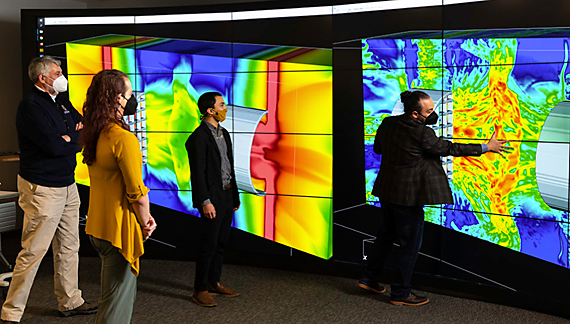|
|
|
|
 Petros Tzeferacos (right), associate professor of physics and astronomy at the University of Rochester, senior scientist at the University’s Laboratory for Laser Energetics (LLE), and director of the Flash Center for Computational Science, uses the University’s VISTA Collaboratory visualization facility to explain FLASH simulations of a laser-driven experiment. (Photo by J. Adam Fenster/University of Rochester)
New FLASH code expands possibilities for physics experimentsThe University’s Flash Center for Computational Science recently announced an exciting milestone: researchers have developed a new version of the FLASH code, the first official update of the code since the FLASH center moved to Rochester from the University of Chicago.
The new version of the code, FLASH v4.7, increases the accuracy of simulations of magnetized plasmas and drastically expands the range of laboratory experiments the code can model.
“This expansion fuels discovery science for thousands of researchers around the world, across application domains, while concurrently enabling the Flash Center to pursue a rich portfolio of research topics at the frontiers of plasma astrophysics, high-energy-density physics, and fusion,” says Petros Tzeferacos, an associate professor of physics and astronomy at Rochester and a senior scientist at the Laboratory for Laser Energetics, who serves as the center’s director. Learn more.
Reducing the temptation to cheat in relationshipsThe beneficial effects of putting yourself in someone else’s shoes are well known. But can doing so in romantic relationships reduce the temptation to cheat? A team of psychologists from Reichman University in Israel and the University of Rochester put that question to the test in a series of three double-blind, randomized experiments.
The answer appears to be “yes.”
Perspective-taking—or putting yourself in our partner’s shoes—not only reduces the temptation to cheat but also inoculates against other partnership-destroying behaviors, according to the study, published in the Journal of Sex Research.
People cheat for a variety of reasons, according to the study’s lead author, Gurit Birnbaum, a professor of psychology at Reichman’s Ivcher School of Psychology. While people may be satisfied with their relationships, they may still betray their partners, Birnbaum notes.
Context is key. “People often cheat not because they planned to do so,” Birnbaum says. “Rather, the opportunity presented itself and they were too depleted—too tired, too drunk, too distracted—to fight the temptation.”
Coauthor Harry Reis, the Dean’s Professor in Arts, Sciences & Engineering at Rochester, agrees that there are multiple reasons for cheating. One of the more interesting ones, says Reis, author of Relationships, Well-Being and Behaviour (Routledge, 2018), is that men are more likely to cheat because they feel that their sexual needs are not being met. The evidence has shown that women, on the other hand, are more likely to cheat because they feel that their emotional needs aren’t met. Learn more.
Center of Excellence in Data Science fosters industry-academia collaborationsThe New York State Center of Excellence in Data Science (CoE) continues to foster strong industry-academia collaborations. Eight current projects that pair researchers with industry partners were awarded a total of $500,000:
- Development of a Framework for the Evaluation of Spatial Audio System Performance, Mark Bocko, Distinguished Professor of Electrical and Computer Engineering, and Immersitech
- Architectural Support to Increase Ising Machine Capabilities, Michael Huang, professor of electrical and computer engineering, and AMD
- Auto Auction Data as a Leading Indicator of Economic Activity and Vehicle Valuation, Jason Kuruzovich (RPI) and ACV
- Auctions Domain Adaptation Using Vision Transformers, Andreas Savakis (RIT) and Kitware
- Developing and Deploying Spoofing Aware Speaker Verification Systems, Zhiyao Duan, associate professor of electrical and computer engineering, and IngenID
- Neural Network–Assisted Femtosecond Laser Fabrication of Antibacterial Surfaces, Chunlei Guo, professor of optics, and Pfizer
- Learning to Localize Sources of Network Diffusion, Gonzalo Mateos, Biggar Family Fellow in Data Science and associate professor of electrical and computer engineering, and IBM
- Microscope dual-mode design for Gabor-domain OCT powered by automated layer detection and feature segmentation, Jannick Rolland, Brian J. Thompson Professor of Optical Engineering, and LighTopTech
Learn more.
PhD dissertation defenseHannah Murphy, translational biomedical science, 10 a.m. February 21, K-307 Auditorium 3-6408, Medical Center.
Prenatal Diurnal Salivary Cortisol and Associated Fetal and Postnatal Growth Trajectories
Host: Tom G. O’Connor
Update on Medical Center progress on health equityThe Medical Center’s Equity and Anti-Racism Action Plan outlines a five-year strategy to begin to create a more equitable system.
During a Public Health Grand Rounds webinar from noon to 1p.m. ET today, Edith Williams, director of the Office of Health Equity Research, and Theresa Green, director of Health Equity Education, both with the University’s Clinical and Translational Science Institute, will present highlights of the progress in health equity education and health equity research. Learn more.
When Williams joined the Office of Health Equity Research as its founding director last September, she immediately added several new staff members to her team.
Learn more about the office’s growing team.
The office is seeking a full-time project coordinator to manage project initiation, milestone identification, and project planning. Apply today using the link that best describes you (UR employee | outside candidate) and search for Job ID 241548.
UR-CTSI seeks co-director for KL2 programA new co-director is sought for the KL2 Career Development Program to bring expertise and experience to benefit program scholars and enhance the program’s ability to achieve its training objectives.
The ideal candidate will be an experienced mentor with NIH funding and experience writing NIH training grants. Learn more and submit a CV to search committee chair Edwin van Wijngaarden by March 1, 2023. Learn more.
|
|
|
|
|